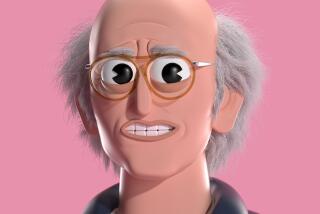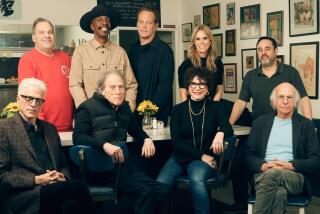TRAVELS WITH CHARLEY
- Share via
You wish you were Charles Kuralt when you write about Charles Kuralt.
You want to describe him as eloquently as he does the people in Silver Dollar, Mo., or Tarpon Springs, Fla., or Booneville, Calif., or Bigfork, Minn.
You want to say more than Kuralt is 51, fat and bald, that he’s gentle, that he smokes too much, that he’s corny and sentimental, that he’s as American as Brooklyn and grits, that his “On the Road” pieces for CBS News are a treasure.
Better to hear Kuralt speak for himself, though, as he did on CBS one Thanksgiving in Prairie, Miss., where the nine children of a former black sharecropper and his wife had returned home for their parents’ 50th wedding anniversary.
The sons and daughters of Alex and Mary Chandler all had become successful college graduates, digging their way out of poverty by digging up the soil, picking cotton and pulling corn.
Kuralt: “So, helping themselves and helping one another, they all went away. And now, 50 years after life began for the Chandler family in a one-room shack in a cotton field, now, just as they were sitting down in the new house to the ham and the turkey and sweet potatoes and corn bread and collard greens and two kinds of pie and three kinds of cake, now Donald arrived--the youngest--who had driven with his family all the way down from Minneapolis. And now the Chandlers were all together again.”
Whew!
The emotional homecoming of the Chandlers is included in “On the Road With Charles Kuralt,” a freshly published collection of some of the best TV essays that Kuralt has done through the years.
As you read the words, Kuralt’s NOW voice takes over in your mind, and some of the stories seem almost to jump off the page and seize you by your tear ducts.
“We did cry when we did the one on the Chandlers,” Kuralt said during a stopover in Los Angeles on his cross-country book-promotion tour. “Izzy (Bleckman, his cameraman) was crying so much that he couldn’t see through the lens.”
Who says there isn’t at least some good news on TV?
The Chandler story is exactly the kind that Kuralt loves to tack on the end of “The CBS Evening News” because it makes a positive statement about America. The underdog Chandlers proved that hard work can overcome great obstacles, though not always.
“America is so rich and varied, that anything you say about it is true,” Kuralt said. “It is true that if you work hard enough, you can make it. And it’s also not true.”
Kuralt is the unofficial dinosaur of TV news. He must seem stale and musty to reporters who want to tell the story of the world in 90 seconds. He doesn’t like to compete for stories, preferring to discover them almost accidentally, as one would discover teeming insect life beneath the bark of a tree.
He isn’t trendy or hip or under 35, so he wouldn’t qualify even as a fireplug on “West 57th,” the shallow, high-tech news magazine program that had a recent trial run on CBS and is expected to return later this season despite dismal ratings.
Some of its fans have enthusiastically described “West 57th” as the TV news of the future. True?
“I hope not,” said Kuralt, who saw only the first episode of “West 57th” and “didn’t like it much.”
It’s ironic that “West 57th” may have a future at CBS after drawing worse ratings than two superior CBS News magazine series in which Kuralt played central roles. Those two, “American Parade” and “Crossroads,” were canceled after only brief trials.
A greater disappointment to Kuralt, though, was his own cancellation as co-anchor of “The CBS Morning News” after only a short stint in 1981. He was already anchor of the acclaimed “CBS Sunday Morning.”
“I thought the country needed a hard-news alternative in the morning,” he said. “My idea in doing the show was to come in early and start typing away as fast I could. And then Diane Sawyer came and started typing away as fast as she could. We tried to write it in a very elegant way.”
Elegance was not the style of the CBS News regime, though. Sawyer stayed, but Kuralt was off the show and back on the road, back to a life he says he still loves.
Although his official residence is Manhattan, Kuralt is continually on the road. He spends five days a week in a 28-foot van with Izzy and soundman Larry Gianneschi Jr., then flies back to New York on weekends to anchor “CBS Sunday Morning.” Then on Monday he flies back to Izzy and Larry.
They learn about most of their stories in the mail or from newspaper clippings. Others they stumble across on the road. “We see people with kids swinging on a limb,” said Kuralt, “or people flying kites or a sign in the front yard of a home in Ohio that says, ‘Welcome Home Roger.’ It turned out that Roger was coming back from Vietnam and his wife had a child he had never seen and his mother was baking a cake.”
And there was Eddie Lovett, another black sharecropper’s son who lived at the end of dirt road in the Arkansas woods.
Lovett was a self-taught carpenter who turned his tin-roofed shack into a library consisting of thousands of books that he read and reread day and night, trying to set an example for his children, believing that ignorance was an enemy to be attacked.
Long after doing the story, Kuralt learned that a fire destroyed Lovett’s shack and his beloved library. “We mentioned the fire on the evening news, and hundreds of people sent him books,” he said, “so many of them, in fact, that Eddie called and said, ‘Please stop the people from sending any more books.”’
What else would you expect? On the road with Charles Kuralt, there are no unhappy endings.
More to Read
Sign up for The Wild
We’ll help you find the best places to hike, bike and run, as well as the perfect silent spots for meditation and yoga.
You may occasionally receive promotional content from the Los Angeles Times.






